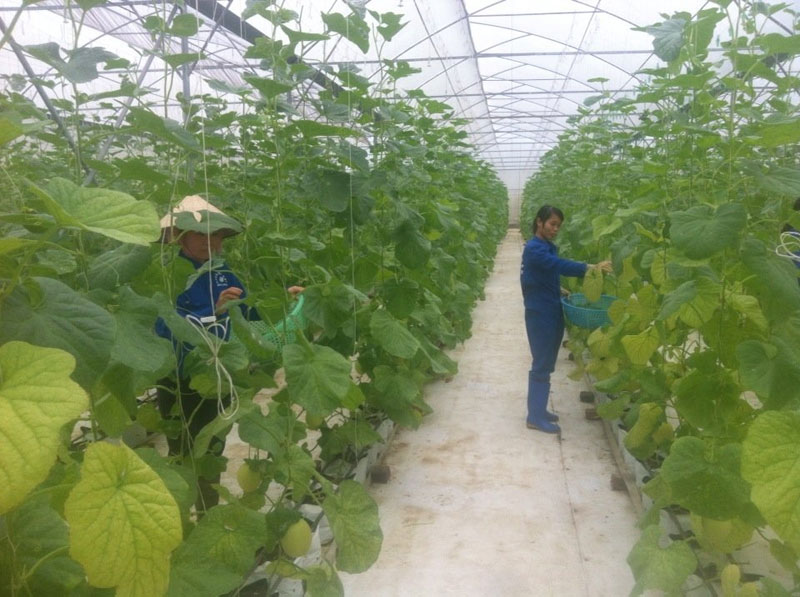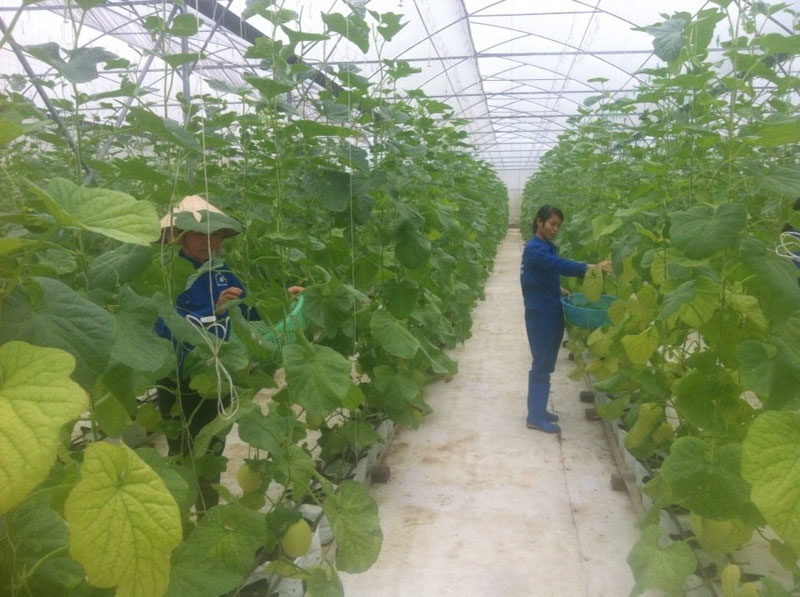
(HBO) – Over the past years, the northern mountainous province of Hoa Binh has issued many documents on scientific-technological development. They include the Action Programme No. 40-Ctr/BCSD dated February 18, 2016 of the Party Committee of the provincial People’s Committee on the implementation of the resolution of the provincial Party Organisation Congress for 2015-2020, and the project on scientific-technological development for the 2016-2020 period, with an orientation towards 2030.

Hoa Binh Gap One
Member Limited Company in Thanh Ha township, Lac Thuy district invests in growing
Kim queen melon in glasshouses.
Scientific-technological tasks at the provincial level
focus on urgent issues and requirements in reality. The most noteworthy in the
field of social sciences and humanities is the project on building the input
method editor of the Muong language in service of the preservation and
promotion of the Muong culture in Hoa Binh province. In the sphere of natural
sciences and technology, projects target the reasonable use and exploitation of
natural resources and environmental protection, such as the project on GIS
technology application in building e-maps managing irrigated areas in Cao Phong
and Luong Son districts. In education-training and public health care, there is
a project on studying chemical elements and evaluating biological activities of
compounds separated from Xa den (scientifically known as Celastrus hindsii Benth).
In agriculture, tasks aim to speed up the
scientific-technological application in producing livestock and plant varieties
that have good quality and are resistant to pestilent insects and suitable with
local ecology, looking towards the development of concentrated goods production
areas. The province has developed production areas of Cao Phong orange, chayote,
pomelo, Luong Son snake gourd, Son Thuy longan, hat doi (scientifically known
as Michelia tonkinensis) in Lac Son, and Tan Lac and Mai Chau garlic. The
province has also worked to build brand name for fish and shrimp of Hoa Binh
Lake.
Since 2013, the province has implemented nine projects
worth 87.9 billion VND sourced from scientific-technological development fund.
According to data from the Hoa Binh Provincial Party Committee, the industrial production index for the first six months of 2025 is estimated to have increased by 20% compared to the same period last year. This marks the highest year-on-year growth rate for this period since 2020.
In the first six months of 2025, Hoa Binh province’s export turnover was estimated at 1.145 billion USD, marking an 18.11% increase compared to the same period in 2024. Import turnover was estimated at $ 804 million, a 17.15% increase, which helped the province maintain a positive trade balance.
The lives of the ethnic minority farmers in Tan Lac district have gradually improved thanks to the new directions in agricultural production. This is a testament to the collective strength fostered through the professional associations and groups implemented by various levels of the district’s Farmers’ Union.
With the motto the "product quality comes first,” after nearly one year of establishment and operation, Muong village’s Clean Food Agricultural and Commercial Cooperative, located in Cau Hamlet, Hung Son Commune (Kim Boi district), has launched reputable, high-quality agricultural products to the market that are well-received by consumers. The products such as Muong village’s pork sausage, salt-cured chicken, and salt-cured pork hocks have gradually carved out a place in the market and they are on the path to obtaining the OCOP certification.
In the past, the phrase "bumper harvest, rock-bottom prices" was a familiar refrain for Vietnamese farmers engaged in fragmented, small-scale agriculture. But today, a new spirit is emerging across rural areas of Hoa Binh province - one of collaboration, organisation, and collective economic models that provide a stable foundation for production.
Maintaining growing area codes and packing facility codes in accordance with regulations is a mandatory requirement for agricultural products to be eligible for export. Recently, the Department of Agriculture and Environment of Hoa Binh province has intensified technical supervision of designated farming areas and packing facilities to safeguard the "green passport" that enables its products to access international markets.



